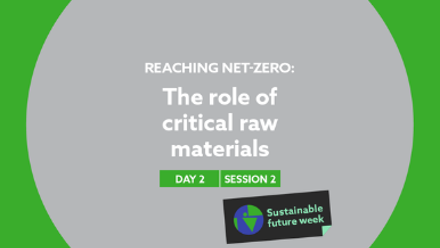IOM3 welcomes the UK’s first-ever critical minerals strategy
IOM3 has welcomed the UK’s new strategy that aims to improve the security of the supply of critical minerals.

'Almost every part of modern daily life relies on minerals, often mined thousands of miles away.’ said Kwasi Kwarteng, Secretary of State for Business, Energy and Industrial Strategy. ‘From our cars to mobile phones, wind turbines to medical devices, modern society is quite literally built on rocks. It is vital that we make our supply chains more resilient and more diverse to support British industries of the future, deliver on our energy transition and protect our national security. …the UK once was – and will now be again – a leading player in the global race for critical minerals.'
‘Resilience for the future: the UK’s critical minerals strategy’ was developed in consultation with an expert group, which included IOM3 President Neil Glover FREng CEng FIMMM and several other IOM3 members. Mr Glover said ‘‘The Institute of Materials, Minerals and Mining (IOM3) welcomes the UK government taking a strategic view on critical raw materials. We look forward to continuing to contribute to the evidence based policies that will play a vital part in the achievement of our net-zero commitments and in supporting the future of manufacturing in the UK.’
IOM3 CEO Dr Colin Church FIMMM, said, ‘There is a great deal of positive language in this strategy that picks up on a number of issues that IOM3 has been pushing hard on. From acknowledging the risks to our supply chains, through a welcome recognition of the need to address the growing gap in mining-related skills, to a focus on greater circularity for critical minerals, it is encouraging to see the government make steps towards taking the strategic view on critical raw materials that IOM3 has been calling for. The strategy promises a delivery plan later this year; this will be key to turn the very positive language into real action on the ground.’
The strategy sets out a three-pronged approach:
Accelerate the UK’s domestic capabilities
1. Maximise what the UK can produce domestically, where viable for businesses and where it works for communities and our natural environment.
2. Rebuild our skills in mining and minerals.
3. Carry out cutting-edge research and development to solve the challenges in critical minerals supply chains.
4. Make better use of what we have by accelerating a circular economy of critical minerals in the UK – increasing recovery, reuse and recycling rates and resource efficiency, to alleviate pressure on primary supply.
Collaborate with international partners
5. Diversify supply across the world so it becomes more resilient as demand grows.
6. Support UK companies to participate overseas in diversified responsible and transparent supply chains.
7. Develop our diplomatic, trading and development relationships around the world to improve the resilience of supply to the UK.
Enhance international markets
8. Boost global environmental, social and governance performance (ESG), reducing vulnerability to disruption and levelling the playing field for responsible businesses.
9. Develop well-functioning and transparent markets, through improved data and traceability.
10. Champion London as the world’s capital of responsible finance for critical minerals.
Antimony, Bismuth, Cobalt, Gallium, Graphite, Indium, Lithium, Magnesium, Niobium, Palladium, Platinum, Rare Earth Elements, Silicon, Tantalum, Tellurium, Tin, Tungsten and Vanadium.
It also places five minerals on the “watchlist” as potential future critical materials:
Iridium, Manganese, Nickel and Phosphates.
Read more - ‘Resilience for the future: the UK’s critical minerals strategy’





![shutterstock_739595833-[Converted]_WEB.gif](https://www.iom3.org/static/1c1ebf41-87ce-4e59-8148c554bd64f253/resourcegridlistingimagedefault_4d12532919c64e60a22baf03232bbf94_4a7c7e45a350/shutterstock739595833-ConvertedWEB.gif)
